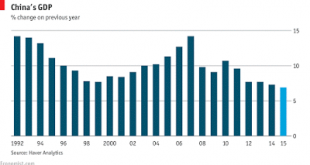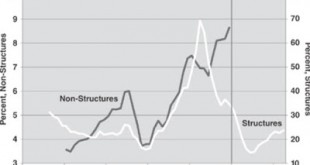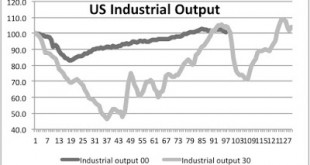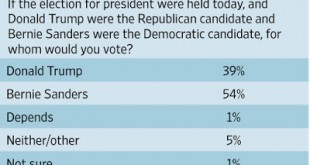[embedded content]
Read More »Chinese slowdown and the world economy
The Conference Board argues that Chinese official data should be taken with some skepticism. Nothing new there. They have adopted a new measure, which implies "Chinese economic growth at a more realistic 3.7 percent" for the recent past. In this scenario, interestingly enough, "it’s likely that the bulk of China’s slowdown has already taken place since 2011, even if unapparent in official statistics." So the picture is probably worse than the official one (as shown below, from The...
Read More »The Mission of Radical Political Economy
The mission of radical political economy is to accentuate the perseverance of critical social scientific enquiry. As such, the aim is to make palpable how the insights of social justice research widely make apparent how the global socioeconomic system does not automatically generate efficient situations whereby unique organizations of production, exchange, and distribution guarantee the attainment of maximum social welfare.The idea that humans are simple instrumentally rationalists, who...
Read More »Bob Pollin on Clintonomics
At The Nation. Few important points. As Bob notes Hillary does invoke the mantle of Clintonomics. In his words: "In trying to burnish her credentials as a can-do populist and to portray Bernie Sanders as a purveyor of naive socialist fantasies, Hillary Clinton has increasingly invoked Bill Clinton’s presidency as her economic policy lodestar." And Bill Clinton's program was not really progressive. Again: "The starting point for understanding Bill Clinton’s economic program is to recognize...
Read More »Consumer credit and mortgage finance in the 1920s
I've been reading Robert Gordon's The Rise and Fall of American Growth: The U.S. Standard of Living since the Civil War (The Princeton Economic History of the Western World), that I bought at the ASSA Meeting in San Francisco. There is a wealth of data. One topic discussed here before was the expansion of credit in the 1920s, and the role of the housing market in the boom of the roaring 20s. Gordon says with respect to the housing market: “One reason homeownership rates soared in the 1920s...
Read More »The Great Depression and the Great Recession compared
So I teach a course on the two (old syllabus here). One of the initial classes looks at Eichengreen and O'Rourke's comparison of the two events, and how, even though at the beginning the shock seemed similar, the recovery has been faster the second time. O'Rourke had noticed in his blog last year that the current recovery started way before, but has been so slow that now the 1930s look better when industrial output (rather than GDP) is used as a measure. Below the same data for the US...
Read More »The Free Market and the Hypocrisy of Small Government at the Rick Smith Show
[embedded content]
Read More »The strongest, most durable economy in the world, but very unequal
Obama went to Detroit this week, and defended his economic record, including the bailout of the auto-industry. He went further on the offensive, as in the State of the Union, and suggested that Republican candidates that complain about the economy don't have a clue. In his words: "The United States of America, right now, has the strongest, most durable economy in the world... So when you hear people -- I won't say who -- but when you hear people claiming that America is in decline, they...
Read More »Wall Street Journal is nervous
WSJ op-ed concerned that "the possibility of an extreme election outcome is no longer unthinkable." Inequality in the 1920s and the Great Recession brought FDR and radical reform. As it turns, Obama was more moderate than people expected, and maybe there is still hope for more radical reform ahead.
Read More »On the natural rate and being always wrong
So I saw that someone linked to an old post of mine in a discussion on Jared Bernstein's blog. The discussion is on productivity slowdown.In that post I quote Alan Blinder on his views (slightly more than a year ago) on the natural rate. He said : "the 'central tendencies' in the Federal Open Market Committee’s latest published forecasts range from 5.2% to 5.5% for the 'full-employment' unemployment rate, and from 2% to 2.3% for the potential GDP trend." So unemployment should be below the...
Read More » Naked Keynesianism
Naked Keynesianism





